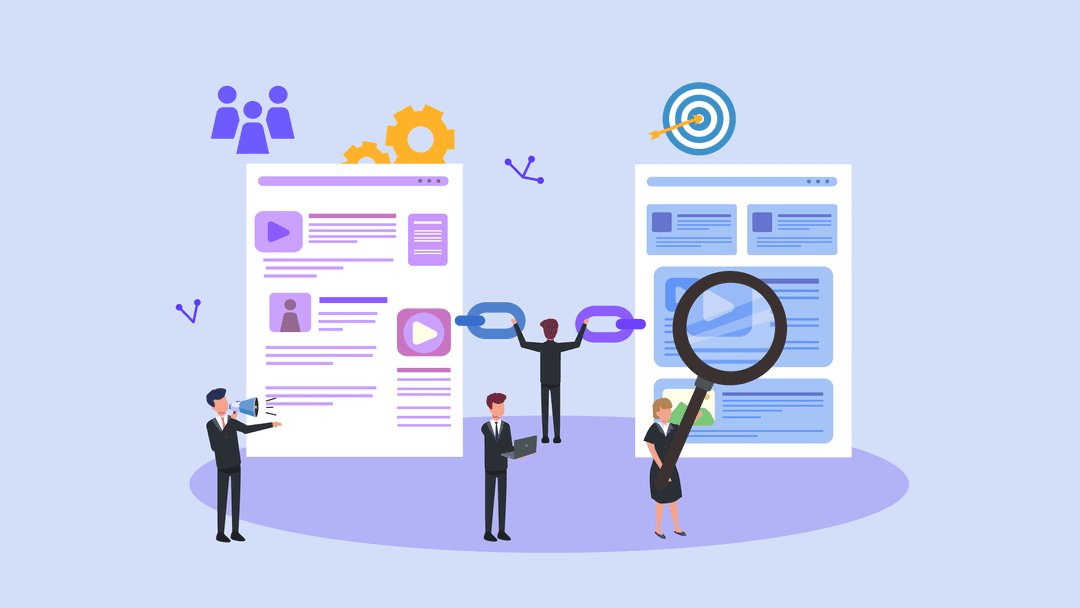What Role Do Backlinks Play in Local SEO?
In the vast, sunburned land of Australia, where businesses jostle for attention like kangaroos in a boxing ring, standing out in local search results is no mere feat. It’s an art. And like any art form, it requires the right tools and techniques. Enter the world of local SEO, where backlinks are the unsung heroes, often overshadowed by their flashier counterparts like keywords and meta tags. But underestimate them at your peril! In this guide, we’ll unravel the mystique surrounding backlinks and their pivotal role in local SEO for Aussie businesses. So, grab your digital surfboard, and let’s ride the waves of backlink knowledge!
Are you looking for experts in local seo services? Go local first are here to help.
Understanding the Basics of Backlinks
What are backlinks?
Imagine you’re at a swanky Melbourne soirée, and someone influential points at you and says, “Hey, that’s the go-to person for [insert your expertise here]!” That’s a real ego boost, right? In the digital realm, backlinks are akin to these shoutouts. Simply put, a backlink is a hyperlink from one website to another. It’s like a digital nod of approval, a tip of the hat, a “G’day, mate!” from one site to yours.
- Dofollow backlinks: The crème de la crème of backlinks. These pass on SEO juice and are a hearty endorsement.
- Nofollow backlinks: These are like getting a nod from someone wearing sunglasses indoors. They don’t pass on SEO juice, but they’re still valuable for traffic.
- UGC (User Generated Content) backlinks: These come from comments, forums, and the like. They’re the laid-back cousins in the backlink family.
Reference: Moz’s Guide to Backlinks
Why are backlinks important for SEO?
Picture this: The vast digital outback of the internet is teeming with websites, each vying for the attention of the mighty search engines. These search engines, like discerning sommeliers, are always on the lookout for the finest vintage websites. And how do they judge this? By the number and quality of backlinks, among other factors.
Backlinks are like the lifeblood of SEO. They:
- Boost Domain Authority: Think of your website as a budding vineyard. The more endorsements (read: backlinks) you get from established vineyards (read: authoritative websites), the more renowned your own vineyard becomes.
- Drive Organic Traffic: A quality backlink from a high-traffic website can funnel visitors straight to your doorstep. It’s like having a bustling Sydney café recommend your boutique coffee blend.
- Enhance Visibility and Credibility: A backlink is a vote of confidence. It’s like having Nicole Kidman say she loves your brand. Instant credibility!
The Role of Backlinks in Local SEO
Local citations and their impact on local SEO
Ah, local citations. They’re the unsung heroes of the local SEO world, much like the diligent postie delivering mail in the Outback. But what exactly are they? In essence, a local citation is any online mention of your business’s NAP (Name, Address, Phone Number). It’s like your business’s digital business card, scattered across various directories, websites, and social platforms.
Now, you might be thinking, “Alright, but what’s the fuss about?” Well, these citations play a pivotal role in local SEO for a few reasons:
- NAP Consistency: Just as you’d be miffed if someone kept getting your name wrong at a BBQ, search engines aren’t too pleased with inconsistent NAP details. Consistency boosts your credibility and search engine trust.
- Boost Local Visibility: Citations, especially from authoritative local directories, amplify your presence in local search results. It’s like having your business billboard on the busiest street in Brisbane.
- Enhance Business Validation: Search engines are a skeptical lot. The more places they find consistent information about your business, the more they trust you’re legit. It’s their way of doing a digital background check.
Quality over quantity: Why local backlinks matter
In the world of backlinks, it’s not just about numbers. It’s about quality. Think of it as preferring a fine Barossa Valley Shiraz over a dozen cheap goon sacks. Local backlinks, especially from reputable sources within Australia, carry significant weight for a few reasons:
- Relevance to the Audience: A backlink from a local source is like a neighbourly recommendation. It resonates more with the local audience, driving targeted traffic.
- Boosts Local Authority: A nod from a well-respected local website or business can significantly elevate your standing in the local digital community.
- Enhances Local Search Rankings: Search engines, in their quest to deliver relevant results, give brownie points to businesses with strong local backlink profiles.
Case Study: The Sydney Scone Shop, a local bakery, saw a 30% uptick in organic local traffic after securing backlinks from prominent Sydney food bloggers and the official Sydney tourism website.
The connection between backlinks and local search ranking factors
Backlinks and local SEO are like Vegemite and toast – they just belong together. Here’s how backlinks influence local search:
- Prominence in Local Search: Google’s local search trifecta consists of Relevance, Distance, and Prominence. Backlinks play a significant role in the “prominence” factor, helping businesses stand out in local search results.
- Balancing On-page and Off-page Efforts: While on-page factors like keywords and meta descriptions are crucial, off-page elements, especially backlinks, provide the necessary counterbalance to boost local SEO efforts.
Strategies for Building Local Backlinks for Australian Businesses
Partnering with local influencers and bloggers
In the digital age, influencers and bloggers are the modern-day equivalent of town criers. They have the audience, the voice, and the influence. Partnering with them can be a game-changer for local backlink building. Here’s how:
- Local Relevance: A shoutout or mention from a popular Melbourne fashion blogger or a Perth foodie can instantly put your business on the map for their vast local following.
- Authentic Engagement: Collaborations, guest posts, or sponsored content can lead to genuine engagement and organic traffic from a relevant audience.
- Tips for Collaboration:
- Research and identify influencers whose audience aligns with your target demographic.
- Offer value – be it in the form of a unique product, service, or insight.
- Maintain authenticity. The Aussie audience can spot a hard sell from a mile away. Keep it genuine!
Engaging in local community events and sponsorships
The Land Down Under is known for its vibrant community spirit. Tapping into this can be a goldmine for local backlink opportunities.
- Community Involvement: Whether it’s sponsoring a local footy match in Adelaide or setting up a stall at Sydney’s weekend market, being actively involved in community events can lead to organic mentions and backlinks from local websites, forums, and news outlets.
- Leverage Local PR: A noteworthy contribution or involvement can catch the eye of local journalists. A feature in a local newspaper’s online edition or a regional TV station’s website can provide high-quality backlinks.
- Examples: Brisbane’s Brewed Delight, a local café, sponsored a community clean-up day and was subsequently featured on multiple local news websites and blogs, leading to a surge in organic traffic.
Utilising local business directories and review sites
While the Yellow Pages might be gathering dust, online business directories are alive and kicking! They’re the digital directories where Aussies look up businesses, and being listed can boost your backlink game.
- Top Australian Business Directories: Consider listings on platforms like TrueLocal, Yelp Australia, and StartLocal. These not only provide backlinks but also increase visibility for locals searching for your services.
- Customer Reviews: Encourage satisfied customers to leave reviews on platforms like Google My Business. Positive reviews can enhance your business’s credibility and lead to organic backlink opportunities from bloggers and journalists.
- Maintain NAP Consistency: As mentioned earlier, ensure your business details are consistent across all directories to boost local SEO.

Common Mistakes to Avoid in Local Backlinking
Prioritising quantity over quality
In the race to amass backlinks, many businesses fall into the trap of quantity over quality. It’s akin to preferring a dozen stubbies of lukewarm beer over a chilled pint of craft brew. Here’s why this approach can backfire:
- Risk of Penalties: Accumulating low-quality or spammy backlinks can attract the wrath of search engines, especially with Google’s Penguin algorithm keeping a hawk-eye.
- Dilution of Authority: A handful of quality backlinks from authoritative local sources can be far more potent than a barrage of irrelevant links.
- Relevance Matters: A backlink from a renowned local blogger or a community website holds more weight than a random link from an unrelated international site.
Ignoring NAP consistency across backlinks
Remember the fuss we made about NAP in local citations? Well, it’s equally crucial for backlinks. Here’s why:
- Search Engine Trust: Consistent NAP details across backlinks signal to search engines that your business is legitimate and trustworthy.
- Avoiding Customer Confusion: Inconsistent details can confuse potential customers, leading them to competitors or causing them to lose trust in your brand.
- Tools to the Rescue: Use tools like Moz’s Local Search Tool or BrightLocal to monitor and maintain NAP consistency across backlinks.
Overlooking the value of internal linking
While external backlinks often steal the limelight, internal linking is the unsung hero that can bolster your local SEO efforts. Think of it as the intricate web of alleyways in Melbourne’s CBD – guiding visitors from one gem to another.
- Boosts Page Authority: Strategically linking to high-authority pages within your site can distribute link equity, lifting the overall authority of your website.
- Enhances User Experience: Guiding visitors through a logical flow can increase engagement, reduce bounce rates, and improve conversion.
- Highlights Important Pages: Use internal links to drive traffic to key service pages, product listings, or promotional offers relevant to the local audience.
For more information about marketing check out the governments marketing page.
FAQs on Backlinks and Local SEO
Q: How often should I audit my backlink profile?
A: Just as you’d service your trusty Holden Ute to keep it running smoothly, regular audits of your backlink profile are essential. Ideally, conduct a comprehensive backlink audit every 3-6 months. This ensures you’re on top of any potentially harmful links and can capitalise on new, quality backlink opportunities.
Q: Are backlinks still relevant in 2023 for local SEO in Australia?
A: Absolutely, mate! While the digital landscape is ever-evolving, backlinks remain a cornerstone of SEO, especially for local businesses in Australia. They act as endorsements, boosting credibility, authority, and visibility in local search results. So, if you’re considering skimping on your backlink strategy, think again!
Q: How do I differentiate between high-quality and low-quality backlinks?
A: Think of backlinks as mates. You’ve got your true-blue friends and then some you’d rather avoid at the pub. High-quality backlinks typically come from authoritative, relevant sites with genuine content. They’re contextually placed and add value to the reader. On the flip side, low-quality backlinks often hail from spammy, unrelated, or low-authority sites. Tools like Ahrefs or Moz can help assess the quality of your backlinks.
Q: Can I buy local backlinks for my Australian business?
A: While it might be tempting to take a shortcut down the backlinking rabbit hole, buying backlinks is a risky business. Search engines, especially Google, have become adept at identifying and penalising unnatural link-building practices. Instead of buying, focus on earning backlinks through quality content, partnerships, and community engagement. Remember, it’s always quality over quantity!
Q: How do I handle negative or spammy backlinks pointing to my site?
A: Every now and then, a few rotten apples might find their way into your backlink basket. If you identify spammy or harmful backlinks, consider reaching out to the website owner and requesting removal. If that doesn’t work, use Google’s Disavow Tool to tell the search engine to ignore these links. Regular backlink audits can help you stay on top of such unwanted links.







